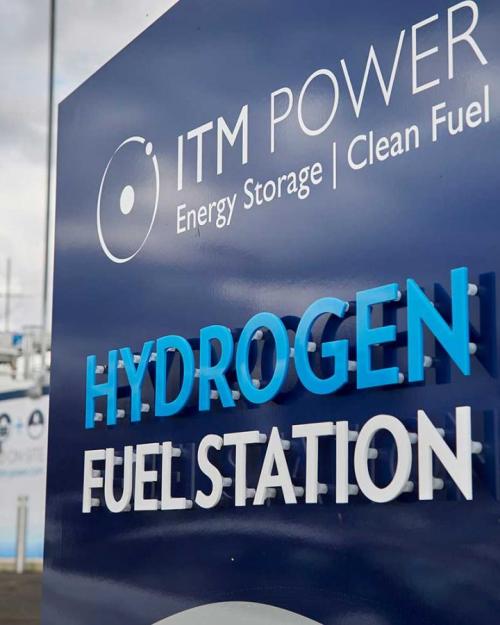Catalyzed by a Cornell Atkinson Center for Sustainability grant and prompted by other Cornell eco-friendly research over the past decade like the Cornell Fuel Cell Institute and the university’s Energy Materials Center, the Standard Hydrogen Corporation (SHC) and National Grid announced plans March 11 to build the first hydrogen “energy station” of its kind in the nation.
The SHC Energy Transfer System will be built in New York’s Capital Region; completion is expected by late 2022.
Pending regulatory approval, the facility will be the first demonstration of Standard Hydrogen’s innovative, multi-use, renewable hydrogen-based energy storage/delivery system. It will be available to fill fuel cell-powered automobiles with carbon-free energy, while also fulfilling other energy needs.
Of particular interest to the New York State Energy Research and Development Authority (NYSERDA), which supports SHC through its business incubator, is the facility’s ability to deliver long-duration electrical energy storage.
“There is great hydrogen momentum in New York right now,” said fuel cell chemist Paul Mutolo ’94, executive director of Cornell’s Center for Alkaline Based Energy Solutions and chief executive officer of Standard Hydrogen.
“This system delivers clean power and fuel,” said Mutolo, also a research associate in the Department of Chemistry and Chemical Biology in the College of Arts and Sciences (A&S). “Our designs for long duration energy storage also help to put more solar and wind power on the grid.”
The hydrogen for the SHC Energy Transfer System would be manufactured renewably at the site via an SHC-designed electrolysis system that splits the water molecules – two hydrogen and one oxygen – into gases. The hydrogen gas can power a fuel cell car, leaving just water to escape through the tailpipe.
And by using renewable electricity, such as from solar or wind, to power the electrolysis process, the hydrogen fuel becomes a sustainable source of energy.
“Green, renewable hydrogen is a key piece of the puzzle to reach net zero by 2050,” said Badar Khan, president of National Grid U.S. “The new hydrogen-based system is going to reduce emissions in New York across power, transportation and heating, the three most difficult to decarbonize. Innovative systems like this one are going to move the needle for a cleaner tomorrow.”
Both Standard Hydrogen and National Grid believe that the successful development of advanced renewable technologies, including hydrogen, directly supports New York’s climate mitigation objectives described in the 2019 Climate Leadership and Protection Act.
Standard Hydrogen had humble beginnings. In 2012, the Cornell Atkinson Center funded a $50,000 grant, “A Hydrogen Test Bed at Cornell: Distributed-Scale Biorenewable Hydrogen Generation,” on hydrogen-powered fuel cell electric vehicles. The goal of the project was to understand if electrolysis could be a promising/viable method of delivering hydrogen production for commercial use, and whether it might/could be more efficient than delivering compressed hydrogen fuel.
The grant was led by Mutolo; Elizabeth Fisher, associate professor in the Sibley School of Mechanical and Aerospace Engineering; and Alfred M. Center, professor of practice in the Smith School of Chemical and Biomolecular Engineering
Nine years earlier, the U.S. Department of Energy awarded Cornell $2.25 million to establish the Cornell Fuel Cell Institute, to kick-start the development of fuel cells, including the use of hydrogen as a fuel. Héctor D. Abruña, the Emile M. Chamot Professor in Chemistry and Chemical Biology, and Frank DiSalvo, the John A. Newman Professor Emeritus, both in A&S, served as leads on that grant.
“This project will help demonstrate the real-world impact of technologies that our research at Cornell is helping to advance,” said Abruña.
The Cornell Fuel Cell Institute – now called the Energy Materials Center at Cornell (emc2) – was the first of a national cohort of Energy Frontier Research Centers, a new U.S. Department of Energy program in its Office of Science.
Standard Hydrogen was a startup launched from emc2 in 2012. While the company is not commercializing the university’s technology, its genesis came, in part, from the Cornell-GM partnership that continues today.
Cornell also supported the startup company directly through the Center for Future Energy Systems, a New York State Center for Advanced Technology.
Read the story in the Cornell Chronicle.




